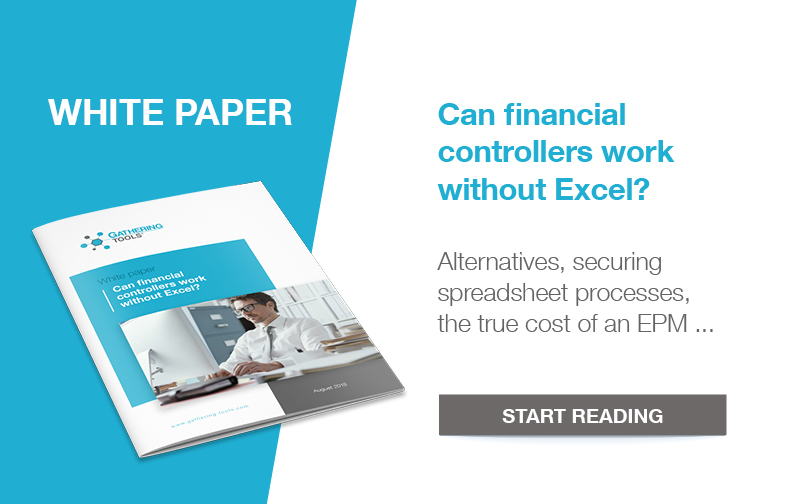Is it possible for a management controller to manage without Excel? Some prefer other tools to make their processes reliable and to enhance their data quality. But when they do, often with the help of their IT Department, they always have a good reason to pull out a spreadsheet. Is Excel, then, a sort of a native language of management control, which one never forgets, reassures and always serves?
Excel in the DNA of the management controller
 You probably might have been using a spreadsheet for quite some time now. The business controllers may not all remember their first use of Excel. But one thing is certain, it was well present before they were hired and during their training… Dashboard, budget consolidation, gap analysis, simulation, and planning, both from schooling years, Excel stands out as the Swiss knife of the controller. Not surprisingly, it still features prominently in the NFDM training catalogue, which promotes it with the slogan “Do all our conversations end in an Excel spreadsheet?”
You probably might have been using a spreadsheet for quite some time now. The business controllers may not all remember their first use of Excel. But one thing is certain, it was well present before they were hired and during their training… Dashboard, budget consolidation, gap analysis, simulation, and planning, both from schooling years, Excel stands out as the Swiss knife of the controller. Not surprisingly, it still features prominently in the NFDM training catalogue, which promotes it with the slogan “Do all our conversations end in an Excel spreadsheet?”
In an enterprise, spreadsheets have also become a universal language of exchange between management control and those who manage budgets. To trace their expenses or forecast, a marketing manager, a buyer, a workshop manager will complete the spreadsheet that has been provided to them, to feed the consolidation workflows. In addition, some management controllers have reached a level of expertise so advanced on Excel that the IT Management is hesitant when it comes to the maintenance or portability of their tables, macros, and financial functions.
Can we manage without Excel? Yes, but…
 The management controllers are also in the best position to identify the limits of spreadsheets: insecure workflows, difficulty handling large volumes of data, quality defects in the information collected … By vigorously wondering if the V3_OK version of the marketing budget was really O.K, many have opted for financial performance management (EPM or CPM) solutions. At the price of deployments and budgetary costs, they have gained features very suited to their job such as simulation, gap analysis, write back …
The management controllers are also in the best position to identify the limits of spreadsheets: insecure workflows, difficulty handling large volumes of data, quality defects in the information collected … By vigorously wondering if the V3_OK version of the marketing budget was really O.K, many have opted for financial performance management (EPM or CPM) solutions. At the price of deployments and budgetary costs, they have gained features very suited to their job such as simulation, gap analysis, write back …
But, Excel has not disappeared. The proof is that EPM solutions offer plug-ins to synchronise their data with the Microsoft spreadsheet. Because all end users do not have access to this business tool and part of the workflow remains spreadsheet-based. As for management controllers, as soon as they do not have Excel, they continue to use it to make specific “small treatments” independently, including from EPM data such as ad-hoc analysis, reformatting information, specific dashboards, etc. Some even check the results produced by the EPM with their old workbooks, formulas, and macros refined for many years. What’s bred in the bone comes out in the flesh.
Reliable Excel Processes
 It is therefore difficult for the management controllers to draw a line under a tool that passes their professional practice to this extent. However, it is impossible to rely solely on Excel files, whose hidden vulnerabilities and costs are taken into account every day (see our infographic). What if the solution was to keep the existing spreadsheet-based processes while making them reliable?
It is therefore difficult for the management controllers to draw a line under a tool that passes their professional practice to this extent. However, it is impossible to rely solely on Excel files, whose hidden vulnerabilities and costs are taken into account every day (see our infographic). What if the solution was to keep the existing spreadsheet-based processes while making them reliable?
This is the approach proposed by Gathering Tools and used by the management control teams at SMITCOM in Alsace Centrale. Rather than having to rebuild a whole essential section of the business, through workshops with the IT Management and a heavy software investment, Gathering tools makes it possible to secure data flows, add consistency checks and validations levels, and to maintain the existing management rules. Not to forget that these secured spreadsheets look exactly like the files they replace. Because it is in their native language that the controllers express themselves best.




